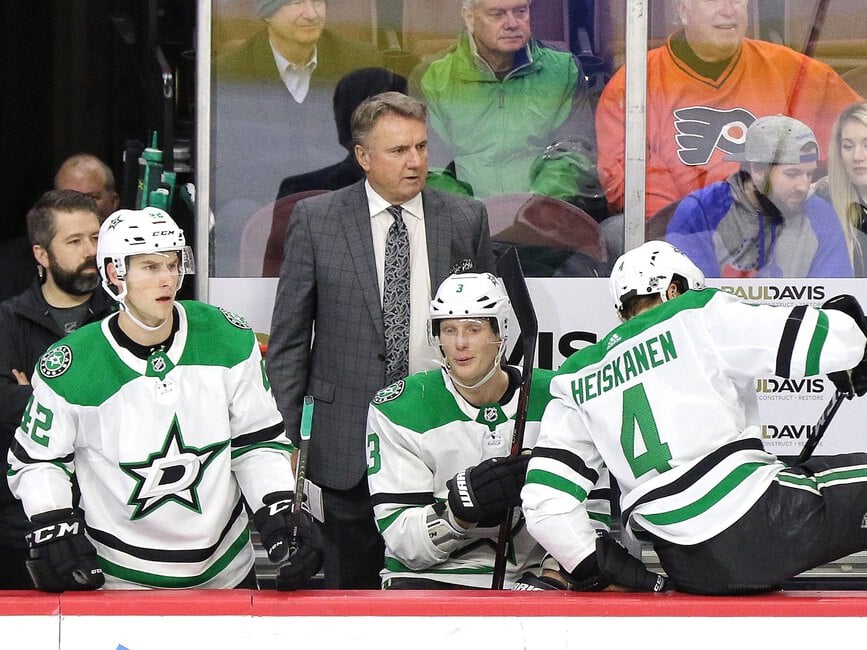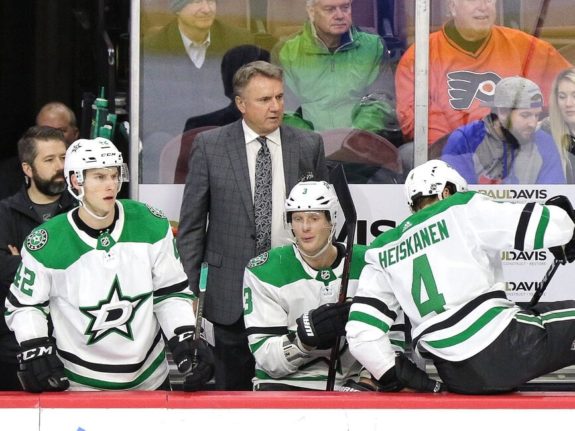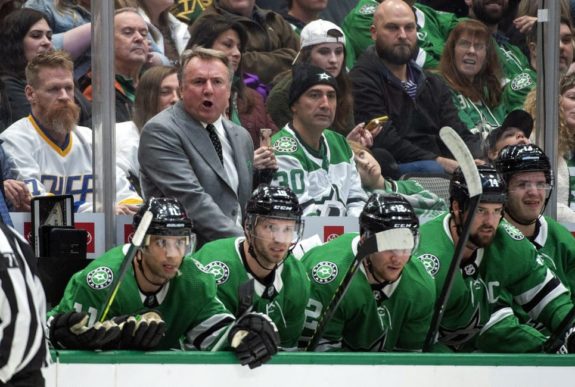
When the Dallas Stars were struck with major adversity in December of 2019, one man was asked to pick up the pieces: Rick Bowness. Taking over as head coach with no warning is a tough ask but Bowness handled it well. He responded by leading his team to the best record in the NHL over the next few months.
He was hit by adversity one after another and continued to shrug them off and maintain control of his team. That leadership brought the Stars within two wins of their first Stanley Cup since 1999, falling to the Tampa Bay Lightning in six games. Now, midway through another adversity-filled season, the Stars are battling for a playoff spot.
NHL fans are some of the most dedicated, emotional, and passionate fans across all sports. When things go well, they ride the wave and enjoy the good times, and when things do not go well, they want answers and changes. A common reaction to any tough time is to ask for a new head coach. That has been thrown around a lot during this 2021 season as teams try to adjust to the craziness of the reality we are in. For Dallas, however, that is simply not the answer, and it would be a huge mistake if the Stars were to give up on their coach that has accomplished so much in his short time in Dallas.
Success
The first reason to keep faith in Bowness is that he has had an incredible amount of success in his time in Dallas. After taking over for Jim Montgomery in Dec 2019, the Stars went on to a 20-13-5 record, which included a five-game losing streak just before the COVID stoppage. Before that streak, the Stars were the most consistent winning team in the league. He immediately found a way to bring out the best in his team as they rolled through tough road trips, injuries, and plenty more.
Bowness and the Stars faced their toughest adversity when COVID-19 put a halt on the NHL season in March 2020. In a way, the break was a blessing in disguise for a Stars’ team that was tired and who had barely had any practice time with their new coach.
As the NHL returned to play for the 2020 playoffs, the Stars were given that chance with a mini training camp before heading to the Edmonton bubble. Bowness introduced a new style of play that brought his defenseman up into the offensive side of the ice much more. Before this break, the Stars were one of the lowest-scoring teams in the league, but this change brought a whole new life to their squad. In the run to the Stanley Cup Final, their defense scored more than 60 points, led by their superstars John Klingberg and Miro Heiskanen. The team as a whole increased their goals per game from a mediocre 2.58 to 2.85 in the playoffs.
The team not only performed better but they never quit.
‘Next Man Up’ & Comeback Mentality
One of the main reasons the Stars made it as far as they did was they believed they could overcome anything. Whether it was a 3-0 deficit within a game, a blown series lead, or a pile of injured superstars, they found a way to overcome it. ‘Next Man Up’ became one of the team’s mottos during the playoffs, as they were hit with injuries to essentially every player. When Ben Bishop was injured, Anton Khudobin played the best hockey of his career, winning 14 of his 24 starts. When Andrew Cogliano missed Game 7 of the second round vs. the Colorado Avalanche, rookie Joel Kiviranta stepped in to score a hat trick and win the game in overtime. When Tyler Seguin was slowed down by an injury, Roope Hintz, Denis Gurianov, and others stepped in to fill the scoring hole. The team had faith in every player from the top of their roster to the bottom of the ‘Taxi Squad.’
The Stars were able to deal with adversity within their games as well. In Game 4 of the first round vs. Calgary, the Flames were 11.9 seconds away from a 3-1 series stranglehold when Joe Pavelski tied the game and forced overtime. The Stars won the game in overtime to tie the series 2-2. They also faced a 3-0 deficit in Game 6 of that same series with the chance to advance to the second round, but once again, they answered the bell. Dallas scored seven straight goals to roll over the Flames 7-3.
The second round would be no easier as the Stars saw their 3-1 series lead evaporate when Colorado forced a Game 7. Not only did Dallas respond again, but they would have to respond multiple times within the game itself. Colorado held leads of 2-1, 3-2, and late 4-3. The Stars answered back to every lead and eventually won the game in overtime to advance to the Western Conference Final.
Even when they were extremely shorthanded from injury and seemed to be down and out trailing Tampa Bay 3-1 in the Stanley Cup Final, they still found a way to respond and win Game 5 before finally running out of gas.
Of course, the ability to respond to adversity needs to come from the players, but without the proper style and trust from the coaching staff, no team has that ability.
A Player’s Coach
It is a fairly consistent answer when Stars players are asked about their coach. It falls somewhere along the lines of a ‘great coach, understanding, approachable, and a player’s coach.’
“He’s probably the best coach that I’ve played for,” Jamie Benn said. “I’ve played for a lot of great coaches, but he’s got to be right up there. Our relationship has definitely gotten stronger, closer. There’s obviously a lot of communication between a head coach and a captain. The door is always open to his office and I can always go in there, as well as the rest of our team. A great person, a great coach.”
When the captain speaks that highly of their coach, you know they are doing something right.
Bowness has an open-door policy that extends to all players. The ability to just walk in and talk to him about how you are feeling, how you are playing, or anything that may be bothering you is something that any player dreams of. It may not sound like a big deal, but it can pay dividends for a player’s confidence.
Rookie Jake Oettinger told the media that Bowness contacts him after every game that he plays in, whether the team wins or loses. “Multiple times this year, Bones [Rick Bowness] has texted me after games, whether it is a win or a loss. That does so much for a young goalie, and to have the feeling of the guys believing in you and that they want you to succeed is really special and something I don’t take for granted,” Oettinger said.
Currently, the Stars are in a spot where they need to put a lot of their trust in younger players. The time for them to be a part of the team is right now, whether they are ready or not. That communication from the coach has played and will continue to play a massive role in their growth and the success they can have early in their careers.
Respect
There is a fine line that you have to walk as a coach in order to earn the respect of your players. If you cross over too much into the Herb Brooks ‘coach, not friend’ style, the players will not respond to you or feel like you care. However, if you become too much of a friend, they will not respect you, which can be worse. Bowness walks this line beautifully.

“He’s got good values, and he lives by them,” Stars’ General Manager Jim Nill said. “He wants you to play by his structure, but he’s very open to discuss it with the players. When he needs to lay the law down, he can. But the key to laying the law down is do people respect you? They do with him because he earns that respect.”
“That’s the difference in the roles. When you’re head coach, you have to make the decisions, and sometimes people don’t like those decisions, but he has done a great job of walking that line.”
Bowness knows when to step back and let his players and leaders take over, but he also knows when to pick his spots to be the boss. This balance leads to a team that wants to win for you. The Stars play hard for their coach, and whether they want to play better or continue on a hot streak, they want to prove themselves.
“It doesn’t matter if you’re an older guy or a younger guy,” Blake Comeau says of Rick Bowness, “you see him chatting with the players, he’s always in a good mood. He’s the type of personality that you want to play hard for, you want to compete hard for.”
Honesty
Bowness is a rare breed of coach that speaks their minds to everyone. Whether it is in the locker room, on the bench, or with the media, he is an honest man. He is upfront when his team is not playing well, and he is consistent to speak the truth when they are playing well, even if they are not winning. That has been a spark to players and fans this season when the team was struggling to find points but were playing better than the record showed. When the coach continues to talk about sticking with it and that eventually, the tide will turn, it can give confidence to everyone involved, and the Stars have followed their coach’s words. The team finally started to score more goals, and they have points in six of their last seven games.
When Bowness was asked about his coaching style, not surprisingly, he was honest.
“My first coach in minor hockey, he just let us play and have fun, and that stuck with me,” Bowness said. “I never liked playing for coaches that overcoached and dissected every little thing. It’s an imperfect game, it will always be an imperfect game, so you’ve got to let players play to their strengths. Work with them to correct some weaknesses, work with them to play into a team system, but a player has to go onto the ice feeling comfortable and trusting his own instincts. You can never take that away from them.”
Along with the open-door policy, everybody knows where they stand and where the team stands when it comes to Bowness.
“He’s a huge part of this team. The players love him,” John Klingberg said. “He’s very emotional, and he’s honest. When you play a little bad for a moment or if you play really good, he will let you know. The feedback can be positive or it can be negative, but that’s what you want from your coach, you want him to be honest.”
That is a very rare trait that is greatly appreciated by the organization.
Experience
Bowness has coached in over 500 regular-season games with multiple different organizations, both as an assistant and as a head coach. That experience is crucial for any team but especially for one with so many young players on the active roster. All of the values above come from the experience and trial and error of coaching in the league. On top of those, however, are also the tactical advantages that come with the experience.
He knows when to push his team and when to rest, when to yell and when to sit back, when he needs to make a big change and when to stick with the plan, and more than anything, he knows the game.

Along with the respect he earns from his players, he also has the great respect of his staff. Being an assistant coach for many years, he knows how important it is to feel heard.
“I’ve been in their role before where I had to do that, and I know what they’re going through. I wanted to have input, I wanted to have my opinion valued when I was in that role, and I make sure these guys know that their opinion is definitely valued,” Bowness said.
Let Him Stay
The list of reasons to keep Bowness is constantly growing for the Stars. Add to this the fact that key players like Seguin and Benn have dealt with nothing but turnover when it comes to their coaches in Dallas. Since Benn came into the league in 2009, he has been led by seven different coaches. The longest tenure of those coaches was only four seasons with Lindy Ruff. While you cannot keep a coach simply for consistency, it is a huge part of the success of a team. Bowness is not only doing enough to keep his job, but he is a shining part of the Stars’ present and their future.
Dallas Stars writer at ‘The Hockey Writers’. Growing up in New Jersey, I have been playing hockey since I was about 7 years old. Like many players, I would do anything to play hockey, especially outdoors. I have always been obsessed with watching and analyzing games from the NHL, NCAA, and many other leagues. I also developed a love for writing in college and continue to write blogs, songs, and stories every day! Check out my personal hockey blog and podcast here:
https://slapshotsamhockey.wixsite.com/slapshothockey
